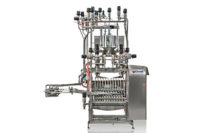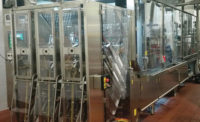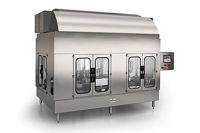Extended Shelf Life Guarantees
To achieve a long shelf life of milk products, it is not necessary to cool the bottling rooms in dairies to 4 °C. Various businesses tread this path.
To achieve a long shelf life of milk products, it is not necessary to cool the bottling rooms in dairies to 4 °C. Various businesses tread this path. The reason is that germs do not increase at this temperature, meaning the risk of contamination is considerably reduced. Other dairies construct laborious sterile rooms for the entire bottling procedure – and introduce germs nevertheless. However, as shown, it can be even more cost-effective: with over pressure and Fischer technology.
Because, in principle, all these measures are secondary procedures when viewed in this light: the air must not be sterile in the production hall, but rather in the foodstuff tank. And the Sterivent and Laminar-Flow filters provide for exactly this necessity, as they will be presented by the German-Israeli exhibitor Fischer Planning at the “International Dairy Show” between 19th and 21st September 2011 in Atlanta.
A case study of the Tara dairy corporation in Israel proves it: Ultra-clean lines based on the mentioned innovative filter technology for ripening tanks and buffer containers, as well as the bottling machinery, lengthen the shelf life of products by up to 100 percent. Due to these successes, major producers, such as Emmi and Nestle in Switzerland and Unilever and Coca Cola, have already taken up the offer. They are equipping part of their new installations with these germ catchers and retrofitting existing production plants with Sterivent and Laminar-Flow. Because the retrofitting is also permitted by the patents from Netanya near Tel Aviv/Israel.
The air purger in a stainless steel casing, consisting of a pre-filter, a compressor and the HEPA filter, were developed by the company especially for dairies. This means the function and construction are focused on the exact installation technology and microbiological conditions in these production sites. This leads to the result, as the mentioned references confirm, that construction volumes, investment costs and operating costs are considerably minimised in comparison with cleanroom solutions or even standard filters, with a filtration degree of 99.997 percent.
The particular efficiency of the Fischer filter system is in the permanent over pressure in the container. This is provided by the ventilator and microprocessors. This over pressure eliminates a hygienic problem zone, which has existed up to now, in the production chain for foodstuffs. Despite sterilisation and microfiltration, despite exact regulation of temperature, flow speed and pressure, despite the most careful disinfection of pipes and systems, a considerable remaining risk of re-contamination remains in many cases. Because a vacuum is created in many tanks, especially when the filling level falls, and this low pressure sucks germs and bacteria back into the storage tank through leaky connections and joints.
This loophole is closed by Fischer technology. The over pressure also ensures that further hygienic problem zones do not develop. For example: The widespread cartridge filters, which are just simply attached to the tanks, work in a de-pressurised state. Consequently, they allow moisture in both directions; moisture, for example, in the form of rising vapours from the filling. These vapours condense in the filter with the consequence that the sterile filter is no longer a sterile filter. Similar damage is often wreaked by cleaning work, during which the casing is sprayed. Or even packaging, which breaks during packing and sprays yoghurt, milk and juices against the filter material. According to Fischer, both the Sterivent and Laminar-Flow principle are, on the other hand, hermetically sealed against such internal and external onsets.
As a result, the economic advantages for producers are clear. Thanks to the integrated sterility or low bacterial contamination of such ultra-clean lines, steam sterile tanks, which are progressively expensive, do not need to be integrated into a production line to keep re-contamination at bay as a result of free air admission. The mandatory filtration automatically, as it were, provides the milk product with the ESL rating, which stands for “Extended Shelf Life”.
Fischer Planning & Consulting
www.fischerplanning.com
To achieve a long shelf life of milk products, it is not necessary to cool the bottling rooms in dairies to 4 °C. Various businesses tread this path. The reason is that germs do not increase at this temperature, meaning the risk of contamination is considerably reduced. Other dairies construct laborious sterile rooms for the entire bottling procedure – and introduce germs nevertheless. However, as shown, it can be even more cost-effective: with over pressure and Fischer technology.
Because, in principle, all these measures are secondary procedures when viewed in this light: the air must not be sterile in the production hall, but rather in the foodstuff tank. And the Sterivent and Laminar-Flow filters provide for exactly this necessity, as they will be presented by the German-Israeli exhibitor Fischer Planning at the “International Dairy Show” between 19th and 21st September 2011 in Atlanta.
A case study of the Tara dairy corporation in Israel proves it: Ultra-clean lines based on the mentioned innovative filter technology for ripening tanks and buffer containers, as well as the bottling machinery, lengthen the shelf life of products by up to 100 percent. Due to these successes, major producers, such as Emmi and Nestle in Switzerland and Unilever and Coca Cola, have already taken up the offer. They are equipping part of their new installations with these germ catchers and retrofitting existing production plants with Sterivent and Laminar-Flow. Because the retrofitting is also permitted by the patents from Netanya near Tel Aviv/Israel.
The air purger in a stainless steel casing, consisting of a pre-filter, a compressor and the HEPA filter, were developed by the company especially for dairies. This means the function and construction are focused on the exact installation technology and microbiological conditions in these production sites. This leads to the result, as the mentioned references confirm, that construction volumes, investment costs and operating costs are considerably minimised in comparison with cleanroom solutions or even standard filters, with a filtration degree of 99.997 percent.
The particular efficiency of the Fischer filter system is in the permanent over pressure in the container. This is provided by the ventilator and microprocessors. This over pressure eliminates a hygienic problem zone, which has existed up to now, in the production chain for foodstuffs. Despite sterilisation and microfiltration, despite exact regulation of temperature, flow speed and pressure, despite the most careful disinfection of pipes and systems, a considerable remaining risk of re-contamination remains in many cases. Because a vacuum is created in many tanks, especially when the filling level falls, and this low pressure sucks germs and bacteria back into the storage tank through leaky connections and joints.
This loophole is closed by Fischer technology. The over pressure also ensures that further hygienic problem zones do not develop. For example: The widespread cartridge filters, which are just simply attached to the tanks, work in a de-pressurised state. Consequently, they allow moisture in both directions; moisture, for example, in the form of rising vapours from the filling. These vapours condense in the filter with the consequence that the sterile filter is no longer a sterile filter. Similar damage is often wreaked by cleaning work, during which the casing is sprayed. Or even packaging, which breaks during packing and sprays yoghurt, milk and juices against the filter material. According to Fischer, both the Sterivent and Laminar-Flow principle are, on the other hand, hermetically sealed against such internal and external onsets.
As a result, the economic advantages for producers are clear. Thanks to the integrated sterility or low bacterial contamination of such ultra-clean lines, steam sterile tanks, which are progressively expensive, do not need to be integrated into a production line to keep re-contamination at bay as a result of free air admission. The mandatory filtration automatically, as it were, provides the milk product with the ESL rating, which stands for “Extended Shelf Life”.
Fischer Planning & Consulting
www.fischerplanning.com
Looking for a reprint of this article?
From high-res PDFs to custom plaques, order your copy today!





